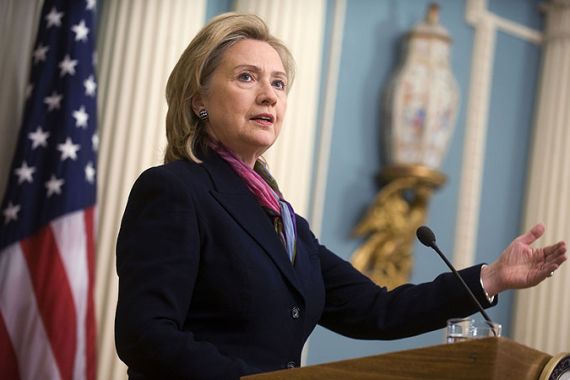US ‘regrets’ Middle East impasse
Days after dropping settlement freeze bid with Israel, Hillary Clinton says US is “frustrated” by the lack of progress.

|
|
| Hillary Clinton said the US will press on for a solution but that it was ultimately up to the parties themselves [Reuters] |
Hillary Clinton has said the United States alone cannot bring peace to the Middle East, and that it was up to the parties themselves to forge a deal on the settlements issue.
In a speech in Washington, the US secretary of state said Israeli and Palestinian negotiators will have to first make some major compromises on the core issues.
Clinton expressed frustration with the impasse and made it clear that the parties themselves are ultimately responsible for settling their long-standing conflict, but insisted that the US administration will “not lose hope”.
She said the US will keep pressing for a solution, and called on Israelis and Palestinians to set aside their differences.
“It is no secret that the parties have a long way to go and that they have not yet made the difficult decisions that peace requires.
“And like many of you, I regret that we have not gotten farther, faster,” she told participants at a Saban Forum, a Mideast policy seminar sponsored by the Brookings Institution think tank on Friday.
Sticking points
Clinton spoke just days after US-brokered direct talks with Israel came to a halt.
| in depth | |||||||
|
The US on Wednesday dropped its bid to persuade Israel to renew a freeze in West Bank settlement building, saying that weeks of efforts to broker a new freeze and resuscitate the peace talks had gone nowhere.
The freeze is a key Palestinian demand for returning to the talks stalled since an earlier slowdown in construction expired in late September.
In her speech, Clinton also said that the parties “have often not been ready to take the necessary steps”.
“Going forward, they must take responsibility and make the difficult decisions that peace requires. This begins with a sincere effort to see the world through the other side’s eyes, to try to understand their perspective and positions.
“Palestinians must appreciate Israel’s legitimate security concerns. And Israelis must accept the legitimate territorial aspirations of the Palestinian people. Ignoring the other side’s needs is in the end self-defeating,” added Clinton.
Yasser Abed Rabbo, the secretary-general of the PLO Executive Committee, told Al Jazeera Clinton’s speech was more like “a lecture that belongs to [the] past, rather than the future”.
“The lectures of the past are not relevant. Basically, the same [American] mistakes are being cloned. Leaving us and the Israelis [to figure it out] is like leaving the wolves and sheep on their own.
“This approach is the same as the American one pre-Annapolis and it does not work anymore,” he said, referring to a conference in the US city of Annapolis in 2007 where the Israelis and Palestinians agreed to further “the goal of two states, Israel and Palestine”. Israel later said it was not bound by it.
 |
| Israel has continued building settlements in occupied East Jerusalem despite US efforts for a new freeze [Reuters] |
Abed Rabbo also noted that the US appeared to be abandoning the terminology and philosophy they had used initially.
“This process is no longer viable. It’s not even enough to stop the damage caused, including settlements,” an official said.
Speaking to Al Jazeera from Los Angeles, Saree Makdisi, a Palestinian scholar and professor at the University of California, said the major problem facing the Palestinians was the lack of a legitimate leadership and the exclusion of a majority of them.
“Who is representing the Palestinians at this point? The leadership that is in Ramallah have very little legitimacy in the West Bank, have no legitimacy in Gaza and essentially the same situation among the majority of Palestinians who don’t live in the occupied territories.
“If the world wants to move towards a genuine peace, they really need to take into account the interests and rights of all the Palestinian people, not just the ones living in the West Bank.”
Makdisi said it is important for all Palestinians “to be included justly in order for there to be real, substantive peace”, and for the world to recognise that and move towards engaging them.
Clinton meeting
Before her remarks, Clinton met senior officials from both sides, including the Palestinian prime minister, the lead Palestinian negotiator, the Israeli defense minister, Israel’s former foreign minister and the UN special envoy for the region.
Following Clinton to the podium, Ehud Barak, the Israeli defense minister, predicted that without an Israeli-Palestinian peace, the cycle of Middle East violence will be perpetuated.
Barak said Israel needs the “political wisdom” to find a way to a two-state solution – a secure Israel existing side-by-side with an independent Palestinian state.
Saeb Erekat, the Palestinian negotiator, after Friday’s meeting with Clinton blamed the Israeli government for the breakdown in talks and said the Palestinians would continue to consult with the US, the UN, the European Union and Arab League on how to proceed.
“They are alone responsible for the derailment of the peace process. The Israeli government had a choice between settlements and peace and they chose settlements,” he said, adding that the Palestinian position remains the same.
